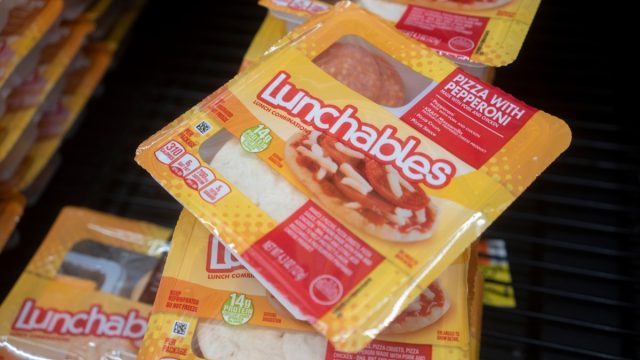Lunchables Have High Levels of Lead, New Report Says: “A Lot to Be Concerned About”

Whether you grew up eating them or you’ve thrown them in your kids’ lunch bags, Lunchables have been a staple for decades. Aside from the nostalgic appeal, these portable snack kits are often the perfect fix for a quick and easy lunch. But you might want to think twice before grabbing Lunchables on your next grocery run, as a new report claims that they have concerning levels of lead.
RELATED: FDA Issues Warning About Lead in Family Dollar and Dollar Tree Cinnamon.
In an April 9 report, nonprofit advocacy group Consumer Reports revealed that it had recently tested several different lunch and snack kits for harmful ingredients. The investigation covered 12 store-bought products, which included three types of Lunchables: Turkey and Cheddar Cracker Stackers; Pizza with Pepperoni; and Extra Cheesy Pizza.
Consumer Reports ended up finding that of all the brands tested—Kraft Heinz, Armour LunchMakers, Good & Gather (Target), Greenfield Natural Meat, and Oscar Mayer—Kraft Heinz’s Lunchables contained the highest levels of both lead and sodium.
“There’s a lot to be concerned about in these kits,” Amy Keating, a registered dietitian at Consumer Reports, said in a statement. “They’re highly processed, and regularly eating processed meat, a main ingredient in many of these products, has been linked to increased risk of some cancers.”
Since there are no federal limits for heavy metals in foods, Consumer Reports measured the lead percentage in each product based on California’s maximum allowable dose level (MADL). According to its report, Lunchables’ Turkey and Cheddar Cracker Stackers had the highest rate of lead at 74 percent of California’s MADL.
The two other Lunchables, Pizza with Pepperoni and Extra Cheesy Pizza, followed right behind at 73 and 69 percent of the MADL, respectively.
“That’s a relatively high dose of heavy metals, given the small serving sizes of the products, which range from just 2 to 4 ounces,” Eric Boring, PhD, a Consumer Reports chemist who led the testing, explained.
RELATED: Ross and T.J. Maxx Accused of Selling Accessories With High Levels of Toxic Lead.
While there are no federal limits for heavy metals in food, the U.S. Food and Drug Administration (FDA) does monitor and regulate levels of lead in foods due to potential health concerns.
“Lead is toxic to humans and can affect people of any age or health status,” the FDA explains on its website. “The potential for adverse health effects from consuming food contaminated with lead vary depending on the level of lead in the food; age of the consumer; length, amount, and frequency of exposure to lead in the food; and other exposures to different sources of lead and to beneficial nutrients.”
Potential health effects from lead exposure can include damage to the brain and nervous system, slowed growth and development, learning and behavior problems, and hearing and speech problems, especially in younger children, according to the Centers for Disease Control and Prevention (CDC).
But Kraft Heinz maintains that Lunchables do not exceed any regulatory limits, as the lead content is still lower than California’s MADL, which is currently the strictest standard in the U.S.
“[We] believe the results of their study are misleading, causing undue concern over the safety of our products—something we take seriously. The fact is that all Lunchables products meet strict safety standards set by government agencies,” the company said in a statement to Today. “The metals they focus on are naturally occurring, and thus low levels may be present in any food product. We do not add these elements to our products.”
RELATED: FDA Issues New Warning on Hidden Dangers of OTC Pain Relievers: “Stop Right There.”
Meanwhile, some experts are cautioning against Lunchables due to the recent findings.
“We don’t think anybody should regularly eat these products, and they definitely shouldn’t be considered a healthy school lunch,” Boring says.
Consumer Reports is also now petitioning the U.S. Department of Agriculture (USDA) to remove Lunchables from the National School Lunch Program. The USDA currently allows two Lunchables kits— Turkey and Cheddar Cracker Stackers and Extra Cheesy Pizza—to be served to nearly 30 million children through the National School Lunch Program, according to the advocacy group.
“Lunchables are not a healthy option for kids and shouldn’t be allowed on the menu as part of the National School Lunch Program,” Brian Ronholm, director of food policy at Consumer Reports, said in a statement.
Ronholm continued, “The Lunchables and similar lunch kits we tested contain concerning levels of sodium and harmful chemicals that can lead to serious health problems over time. The USDA should remove Lunchables from the National School Lunch Program and ensure that kids in schools have healthier options.”
- Source: FDA: Lead in Food and Foodwares
- Source: CDC: Health Effects of Lead Exposure